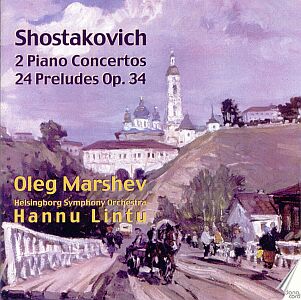Jesper Buhl has made Oleg Marshev his mission. There
are already many Marshev volumes in the Danacord lists. Marshev is bright
and eager and his piano is recorded with real 'oomph'. Here he is partnered
by the Helsingborg orchestra who have superb woodwind and brass complements.
If their violins sound thin-toned this matches Shostakovich's stripped
down approach. In the First Concerto there are the marks of Prokofiev's
Classical, of Mozart and of neo-classicism. Jan Karlsson, the
orchestra's first trumpet does not disappoint and is easily equal to
Vacchiano in the Previn version (Sony). The Mickey Mouse power and silent
film gymnastics of the last three minutes only serve to underline the
gawping and possibly malevolent smile of this music.
The Second Concerto is up against Dmitriev (CFP), Bernstein
(superb but now sounding rather raw) and Ortiz. Marshev's piano is sound-located
forward. The engineering luminously captures the dynamic gradations
of Marshev’s playing. For those who do not know, the Second Concerto
is a more lyrically appealing work than the First. It is populist par
excellence. Only once in the First does the composer feint towards popular
taste and then in a Khachaturian-like gesture in the Moderato.
At the end of the first movement, at 7.18, Shostakovich produces a syncopated
hammering that reminds me of a similar moment in Walton's Sinfonia
Concertante from twenty years previously. The following andante
is played for total enchantment - a combination of the Moonlight,
The Emperor (middle movement) and Rachmaninov 2 - dewdrop romance
distilled. While Marshev does not offer the febrile energy we find in
the Bernstein version he is not short on impact and verve and turns
in a wonderfully well recorded and performed account.
The Preludes are short and lovingly rounded and spun.
They traverse quite a landscape: Debussy, Prokofiev's sarcasm, troika-like
jollity, tonally challenged forays (tr 14), Bachian two-steps, Medtnerian
serenades, undertakers' soliloquies (tr 21), Mozartian games, sinister
little polkas. MusicWeb’s own Paul Serotsky contributes the liner notes
and suggests that these works might almost be part of the crib-sheet
of a silent cinema pianist.
Rob Barnett
see also review by
Paul Serotsky

